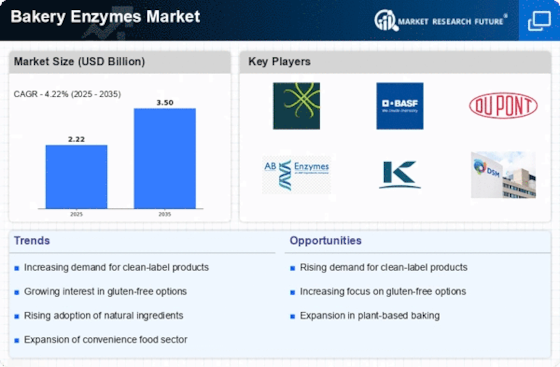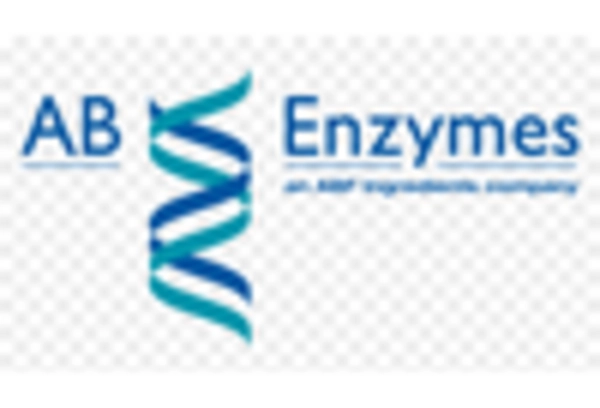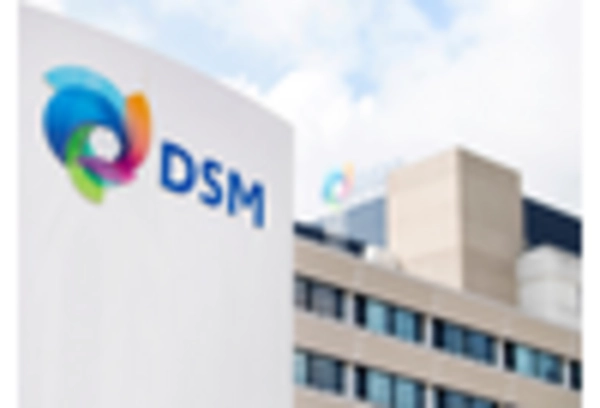Market Trends
Key Emerging Trends in the Bakery Enzymes Market
The bakery enzymes market is witnessing dynamic trends influenced by the evolving consumer preferences, advancements in baking technology, and the demand for improved product quality and shelf life. A significant trend in this market is the increased adoption of enzymes in bakery applications to enhance the production process and achieve desired product attributes. Enzymes like amylase and protease play a crucial role in dough conditioning, improving dough handling properties, and enhancing the overall quality of baked goods. This trend aligns with the bakery industry's continuous efforts to optimize production efficiency, reduce processing time, and deliver consistent and high-quality bakery products to meet consumer expectations.
The clean label movement is influencing bakery enzymes market dynamics, with consumers seeking products with transparent and recognizable ingredients. Manufacturers are responding by offering enzymes derived from non-GMO sources and utilizing natural fermentation processes. This clean label approach aligns with the broader consumer movement towards mindful and informed food choices, where clean, simple, and minimally processed ingredients are prioritized in bakery products.
The pursuit of healthier bakery options is shaping market dynamics, with the use of enzymes to develop products with reduced sugar, lower fat, and improved nutritional profiles. Enzymes contribute to dough modification, enabling the production of baked goods with enhanced texture, structure, and sensory attributes without compromising on taste. This trend aligns with the increasing consumer interest in healthier eating habits and the desire for bakery products that support overall well-being.
Gluten-free and allergen-friendly bakery products are influencing the bakery enzymes market, with the development of enzymes that improve the texture and structure of gluten-free dough. Enzymes such as xylanase and cellulase help address the challenges associated with gluten-free formulations, contributing to the production of gluten-free bread and baked goods with improved volume and crumb structure. This dynamic reflects the growing demand for inclusive bakery options that cater to individuals with gluten sensitivities and allergies.
Sustainability considerations are playing a crucial role in shaping bakery enzymes market dynamics, with consumers expressing a preference for enzymes sourced from environmentally responsible practices. Manufacturers are exploring sustainable sourcing of raw materials, eco-friendly production methods, and ethical extraction processes. This sustainability trend resonates with consumers who prioritize bakery products that align with ethical and eco-conscious values.
The clean label preferences extend to the reduction of chemical additives in bakery products, influencing the use of enzymes as natural alternatives to traditional dough conditioners. Enzymes like lipase and lipoxygenase contribute to dough development and crust color without the need for synthetic additives. This trend aligns with the broader movement towards cleaner and more natural bakery formulations, addressing consumer concerns about artificial ingredients and additives.
The rise of artisanal and specialty bakery products is contributing to market dynamics, with enzymes being used to enhance the texture, flavor, and shelf life of unique and premium baked goods. From artisan bread to specialty pastries, enzymes play a role in creating distinctive and high-quality bakery products that cater to the discerning tastes of consumers. This trend reflects the demand for bakery offerings that stand out in terms of craftsmanship and flavor complexity.
Technological advancements in baking processes are influencing the bakery enzymes market, with innovations such as encapsulated enzymes and enzyme blends that offer improved stability and functionality. These advancements contribute to the versatility and ease of use of enzymes in bakery applications, providing bakers with efficient tools to achieve desired product outcomes. This dynamic reflects the ongoing efforts to enhance the performance and applicability of enzymes in the bakery industry.
Collaborations and partnerships within the food industry are contributing to market dynamics by fostering innovation and expanding the applications of bakery enzymes. Collaborative efforts between enzyme manufacturers, bakeries, and research institutions drive the development of new enzyme formulations, improved production techniques, and the exploration of enzymes for novel bakery product categories. This dynamic highlights the collective and collaborative approach to addressing challenges and unlocking the full potential of enzymes in bakery applications.



















Leave a Comment